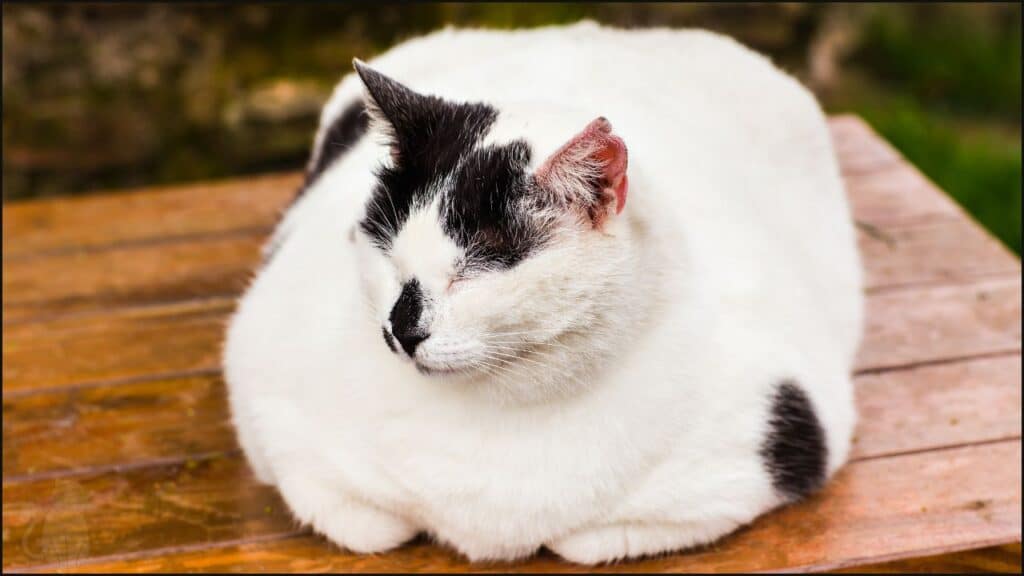What is the average cat lifespan?
14 years.
This number is based on research from 4,009 cats in England.
What decreases cat lifespan most?
The leading cause of death in cats is from road accidents.
Your best chance of keeping your cat alive longer is to keep your cat indoors.
The second best way to keep your cat alive longer is keeping them at a healthy weight.
In the rest of this article, I’ll go through more info on factors that affect a cats lifespan and how to improve your cats chance of living a long healthy life.
Let’s get into the article.
I am not a veterinarian and I recommend seeking the advice of a vet for any further questions. The advice in this article is not intended as medical advice.
How Long Do Cats Live?
Between 13-17 years.
Based on research from 4,009 cats in England, the median lifespan is 14 years.
Breed affects lifespan.
Examples:
- Crossbred cats live longer (~14 years) than purebred cats (~12.5 years)
- Birmans are longest-lived breeds of cats averaging 16 years
Crossbreed cats live longer due to a hypothesized hybrid vigor.
Some breeds tend to have a shorter life.
This includes:
- Bengals ~7 years
- Abyssian cats ~10 years
How old can a cat get?
The longest lived cat (Creme Puff) living an astonishing 38 years.
Between 1994 to 2004 researchers saw a two-fold increase in cat longevity among cats older than 6. This is possibly due to improvements in nutrition and vet care.

What Decreases a Cats Lifespan?
Road Trauma
Trauma causes 39% of deaths in cats.
Most of that (87%) are from trauma related to road accidents.
One study attached cameras to cats in a suburban area in the United States. They found 45% of cats crossed a road.
The National Geographic channel attached a GPS to cats, finding some cats exploring up to one mile around their house.
Leaving your cat outside is risky if your property isn’t secure.

Gender
Female cats live longer than male cats.
On average, a female lives 15 years whilst male cats live 13 years.
Neutered male cats live longer (15 vs 11 years).
Neutered cats tend to spend less time pursuing outdoor adventures, reducing the risk of hazard exposure.
Orange tom cats are very promiscuous and have a high risk of death from road trauma.
Learn more:
Disease
Cats are also susceptible to the following:
- Kidney disease (12.1% of total cat deaths)
- Illness and infection (11.2%)
- Neoplasia (i.e. tumors) (10.8%)
- Mass lesion disorders (e.g. warts and cysts) (10.2%)
Best practice is to make sure to keep up to date with annual vet checkups.
Learn more:

Frequently Asked Questions
Why Do Female Cats Live Longer Than Male Cats?
Hormonal and social factors.
Neutered cats roam less then unneutered males. Roaming around can decrease lifespan due to road trauma, fighting, and disease.
What Is the Average Life Expectancy of an Indoor Cat?
An outdoor cat may only live 2-5 years on average. Indoor cats are less likely to die from road trauma or get parasites.
Keeping your cat active helps indoor cats stay healthy.
Trees, tunnels, toys, and outdoor enclosures all help.

Why Do Outdoor Cats Have More Diseases?
More exposure to:
- Pests
- Fighting
Diseases include feline leukemia virus (FeLV), feline immunodeficiency virus (FIV), bartonellosis, and rabies.
Viruses and parasites suppress the immune system. Transmission occurs through bites and close contact, including mutual cat grooming.
Older cats are most at risk of parasites due to having weaker immune systems.
20 out of 55 cats (36%) in suburban areas ingested liquids and solids not provided by an owner during unsupervised outdoor access, research finds.
A study from Canada showed that 28% of owners allow cats to free roam without supervision.

How Do I Increase My Cats Lifespan?
Two best ways:
- Keep your cat indoors
- Keep your cat at a healthy weight
More than half of US pets are overweight or obese.
Obesity predisposes cats to a higher mortality rate from many conditions. It is well known that the risk of diabetes increases with obesity.
Problems include:
- High blood fat levels
- Mobility disorders
- Reproductive disorders
Cats are carnivores and thrive off a higher protein and moisture diet of animal foods. Hunting cats consume a high protein, low carbohydrate diet.
Here are some other factors involved in weight gain:
- Lower cost pet food
- Free feeding
- Overfeeding treats
Choosing species-appropriate nutrition for cats. Have a feeding schedule and avoid free feeding.
Learn more:

Why Do Cats Only Live 15 Years?
Different animals age faster or slower.
It’s not known the exact reason why.
Some scientists suggest that smaller animals tend to age faster since they have a higher metabolic rate. This seems to produce more wear and tear.
However, some research seems to refute this as some small animals live long. Dogs are larger than cats, but large dogs live a shorter life.
Can cats live 20 years?
Yes.
At least 1% of cats live longer than 20 years according to recording data from veterinary practices in Italy. The maximum lifespan of cats is considered 38 years old.
Can cats live 30 years?
Yes, although it is extremely rare.
The oldest living recorded cat lifespan is 38 from Creme Puff.
Cat Lifespan Comparison Chart
This chart compares the lifespan of different types and breeds of cats.
| Breed/Type | Lifespan | Notes |
|---|---|---|
| Manx cat lifespan | 9-13 years | |
| Persian catlifespan | 12-17 years | High risk of death from urinary tract disease |
| Black cat lifespan | 15 years | May live longer than average due to melanism |
| Tabby cat lifespan | 15 years | Not a breed (hence variable lifespan) |
| Domestic shorthair cat lifespan | 12-14 years | |
| Bengal cat lifespan | ~7 years | |
| Birman cat lifespan | 16 years | |
| Siamese cat lifespan | 12-17 years | Similar lifespan to Persian cats |
Conclusion
The average cat lifespan is 14 years.
The main ways to improve your cats lifespan is to keep them indoors and at a healthy weight.
Road trauma and disease from parasites are common in outdoor cats. As territorial animals, they tend to roam far and wide when given the opportunity.
Maintain regular vet appointments to check for health issues and monitor weight.
